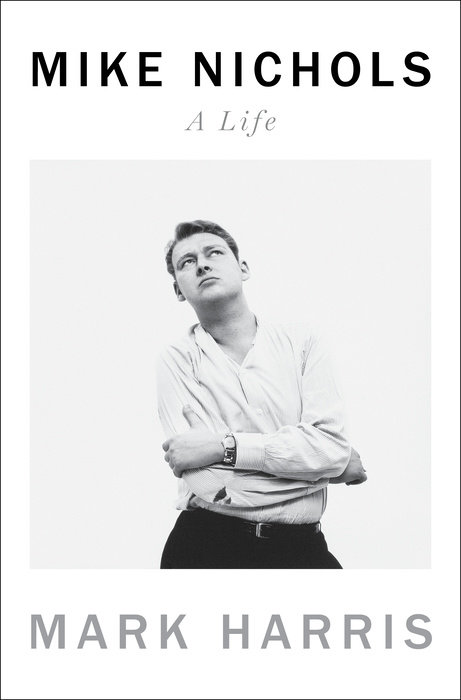Mike Nichols: A Life by Mark Harris (Penguin Press)
Igor Mikhail Peschkowsky, a seven-year-old Jewish boy from Berlin, made it by ship to the U.S. in May, 1939. Exquisite timing, even then. The good luck largely continued.
By 2014, with nine Tony awards, five Oscar nominations (one win), a body of film directing that included “The Graduate,” “Carnal Knowledge” and other classics, and an enduring reputation as one of the defining improv comics of his era (“Nichols and May”), Mike Nichols né Peschkowsky stood for nonpareil artistic timing, having repeatedly reinvented himself as one of the most successful American show-biz wonders of the 20th-century.
How, though, does a biographer tell the tale of an artistic superstar whose greatest gift turned out to be directing—that behind-the scenes mix of power and self-effacement that must be gleaned by its effect on others, and on the final product?
How to understand a high-functioning depressive, an often resentful lavish liver and angry arriviste with a chip on his shoulder–deeply ashamed of the childhood allergy that left him permanently hairless and stuck with a toupee–who became a leading man about Manhattan, squiring partners such as Mia Farrow, Gloria Steinem and Diane Sawyer?
Mark Harris found a way. With dogged reporting, research and interviewing, he more than fulfills the standard duties of the biographer—whence Mike Nichols, how his life developed, all his career hits and misses. Harris’s foremost achievement, however, is to methodically, entertainingly, take us inside virtually every project Nichols worked on in a way that brings theater and film directing alive as a visceral practice.
Reeling in George C. Scott from his benders. Pushing Neil Simon to rewrite. Managing an egomaniacal Walter Matthau. Coaxing Elizabeth Taylor to one of her best performances in “Who’s Afraid of Virginia Woolf?” It’s all here—Harris names names. The upshot is not just that unmistakable feeling aroused by the best biographies—the illusion that you’re simultaneously living the subject’s life alongside the subject–but a privileged look inside what playwright David Hare called “upper show business.”
Harris’s book avoids both hagiography and pathography. As the husband of playwright Tony Kushner, Harris presumably enjoys extra insight into the ups and downs, the pressures and joys, of being an artistic star. Perhaps that accounts for his sublime evenhandedness throughout. The worst of Nichols gets ample play—his petulance, narcissism, arrogance, snobbery, snappishness, womanizing, opportunism, rich-guy elitism, and coke and Halcion problems. The best of Nichols? A laceratingly sharp wit, refined taste, a superb sense of humor, endless professional smarts, and remarkable loyalty to many in his life. Finally, at the core of Nichols’s directing, imperious calm on a set and shrewd insight into how physical clues should always signal character onstage.
Was Nichols a “master of the middlebrow,” or a serious theater artist– an “acid anatomist of human behavior”? Harris credits him as both. Harris also manages another worthy feat—establishing yet again that it’s the rare artist who escapes childhood demons. Like so many American Jews who entered show business—the Issur Danielovich who became Kirk Douglas, the Mendel Berlinger who became Milton Berle–Nichols thought for years that he could, with the help of a name change, suppress the anxieties of his Jewish heritage. His brother Robert deemed him as a child to be “as un-Jewish as it’s possible for a Jew to be.”
That changed. Later, Nichols spoke of his “unbelievable, undeserved, life-shaming luck” in escaping the Holocaust, his sense that “borrowed time” defined his whole life. He proved “physically incapable” of directing “Sophie’s Choice,” or of making it through an exhibit of Nazi-era art. “I should have been six-million-and-one,” he remarked late in life.
Nichols once self-critically quipped that any biography of him ought to be titled The Wrong Jew. Harris rightly ditched that idea. Harris reports that Nichols always believed in himself, and would begin a lot of sentences in his childhood with, “When I’m rich and famous…” From his lips to Hollywood’s and Broadway’s marquees. Nichols turned out to be just the right figure around whom to shape Harris’s masterwork, one of the deepest biographical dives ever into how American theater and film operate in the A-list stratosphere.
Carlin Romano, former NBCC President and current VP Grants, teaches media theory and philosophy at the University of Pennsylvania.



